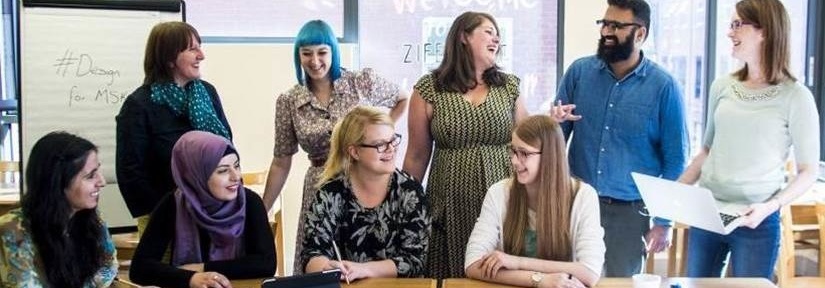BLOG: How can translational research benefit those who might need it the most?
Dr Bella Starling is Co-Director of Public Programmes, working across Manchester University Hospitals NHS Foundation Trust (MFT), NIHR Manchester Clinical Research Facility (CRF) and NIHR Manchester Biomedical Research Centre (BRC). Bella believes public engagement with research can act as a catalyst for social change and, in the first instalment in our new blog series, discusses the benefits translational research can have for society as a whole.

Dr Bella Starling
Translational clinical research, like the research carried out within the NIHR Manchester CRF, has the potential to transform lives for the better, by bridging gaps between new discoveries at the laboratory bench, and individualised care at the bedside.
Most simply, translational research is an effort to build on basic scientific research to create new therapies, medical procedures, or tests. Translational research is specifically designed to improve health outcomes – which is why the work of our research infrastructure here in Greater Manchester (GM) is so important.
While NIHR Manchester BRC connects world-leading researchers based at The University of Manchester (UoM) and three NHS trusts – including MFT – our dedicated and purpose-built NIHR Manchester CRF brings world-class research and experimental medicines to our patients.
We believe that everyone in our increasingly diverse society should benefit from translational research. But this is not currently the case, and we’re going to address this inequity.
Why is inclusive translational research important?
Disease burden remains disproportionately high in socially disadvantaged groups, including within our devolved health ecosystem in GM. Life expectancy can vary wildly across our patch, as this map – produced by our partners at UoM – shows. Yet people from more affluent areas of GM take part in research in our NIHR Manchester CRF sites much more that people from areas with high indices of multiple deprivation, or which are ethnically diverse.
How can translational research accurately reflect and inform the health of all of our population with such skewed participation?
Data from further afield shows we’re not alone. In trials for 24 of the 31 cancer drugs approved in the US since 2015, fewer than five per cent of the patients were black or African American. Hispanics represent 16 per cent of the population, but only one per cent of participants in publicly-funded research in the US. Women are generally underrepresented in early phase clinical trials and people with disabilities are largely absent from research not directly linked to their disability, often through exclusion criteria.
Why the under-representation? In the UK, we are generally supportive of research, as Wellcome Trust data indicates, but this doesn’t necessarily translate into research participation. A recent Health Research Authority (HRA) report on public attitudes to health research highlights the less positive perception of research among lower socio-economic groups and ethnic minorities: only 35 per cent of ethnic minority respondents believed they would be treated with dignity and respect in research, compared to 52 per cent of white respondents. And only 26 per cent of ethnic minority respondents were very confident about the security of their data, compared to 37 per cent of white respondents.
This data reflects negative cultural and historical experiences, and justified distrust of authority institutions.
Until recently, public engagement and involvement has focused on reaching the ‘usual suspects’. The NIHR report Going the Extra Mile summarises:
A diverse and inclusive public involvement community is essential if research is relevant to population needs and provides better health outcomes for all. We have been struck by the degree to which researchers and public contributors have encountered barriers when trying to work with different communities and populations. This suggests a system-wide issue that needs considered and careful attention.
But it’s not all about public attitudes and research participation. How do translational research priorities, design and systems become conscious of and directly address health inequalities? How do we ensure that translational research does not perpetuate health inequalities, albeit unwittingly, rather than address them?
Progress towards ensuring that translational research addresses the needs of and reaches those who stand to benefit from it the most, requires change in both individual practice and research culture.
What we’re doing
The NIHR Manchester BRC and NIHR Manchester CRF set up the Health Inequalities Steering Group in 2018 to address some of the issues above. By working across research infrastructure, including patient and public involvement and engagement, its ambition is to address health inequalities by trying to make our research more accessible and inclusive by:
- prioritising research that is most relevant to poor health outcomes and/or linked to GM priorities
- examining barriers to participation and exploring approaches to broaden access
- developing more inclusive practice for both research participation and involvement.
Some of this work is well underway, and some is emerging. We are:
- Highlighting the research that we already do to address health inequalities is important: you will find some case studies on our addressing health inequalities webpage.
- Promoting inclusive participation, engagement and involvement as a priority. The Public Programmes team, which I co-lead (so, yes, I’m biased!) has established a national reputation as leaders in inclusive research engagement and involvement, practice which can be implemented across our NIHR Manchester BRC and NIHR Manchester CRF research infrastructure.
- Focusing on data as central to our work: having a better idea through rigorous and inclusive data collection of who we are reaching (and not reaching) will inform all that we do. Working with the Manchester Urban Collaborative on Health assures our responsible and thorough approach.
- Supporting our researchers, research staff and wider research community to become more inclusive and conscious of health inequalities, through training, background summaries – such as the NCBI Barriers to Research Participation report – developing and signposting to practical toolkits, such as the Health Inequalities Assessment Toolkit.
This is just the start. We look forward to keeping you up to date with, and reporting on our work in due course.





